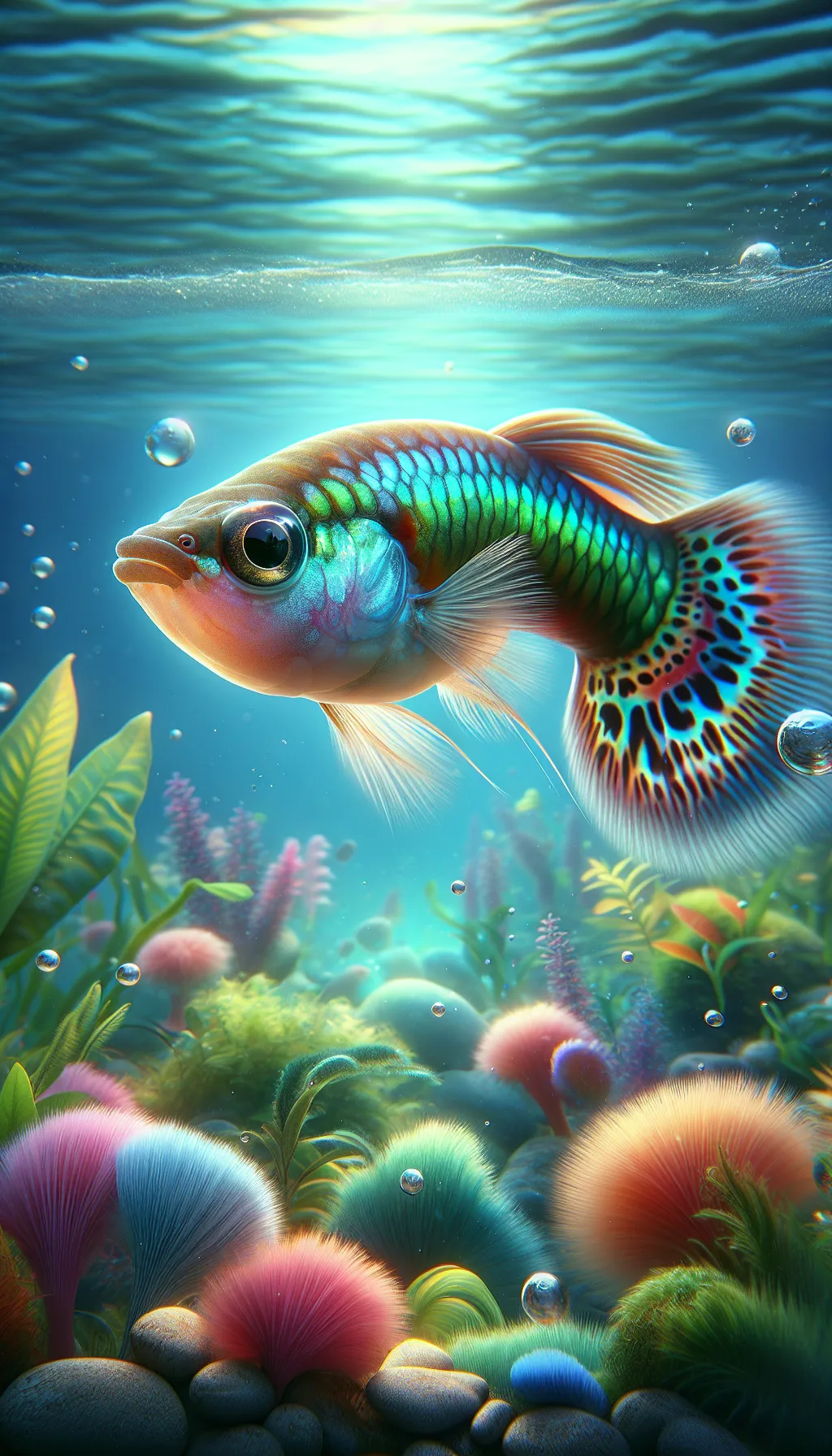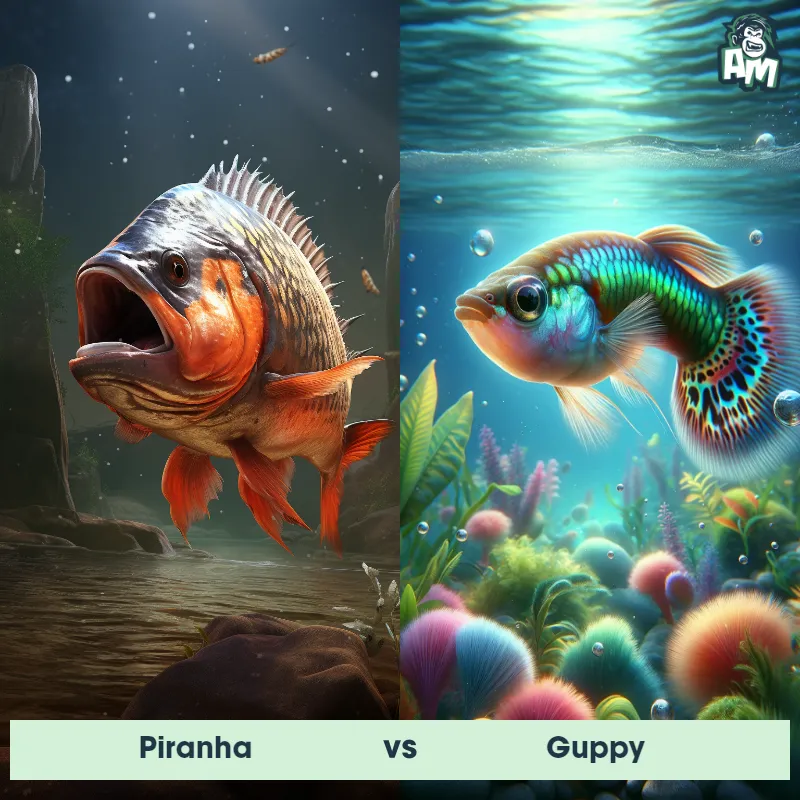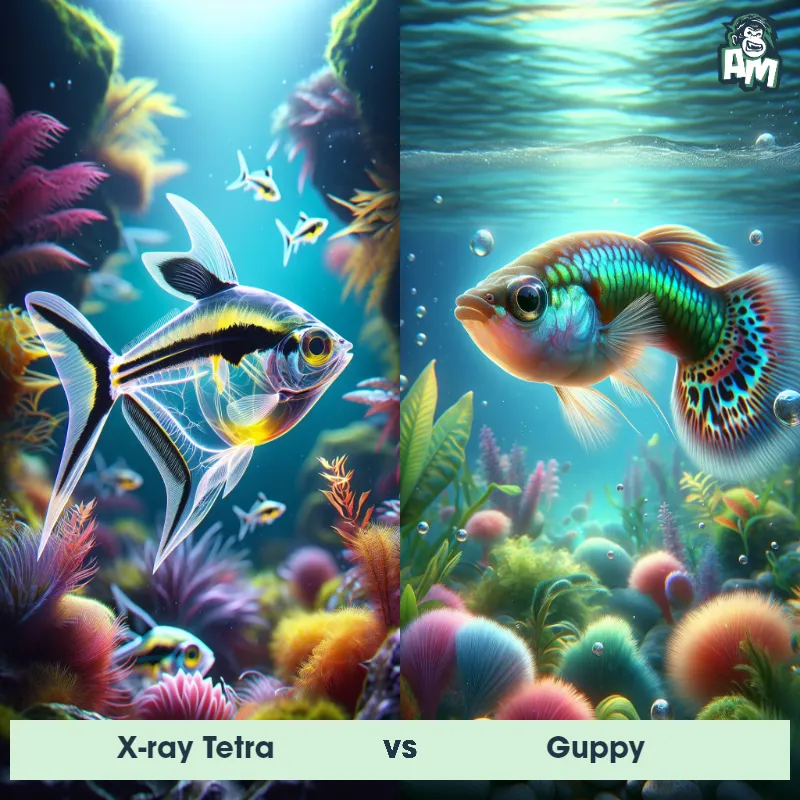The Guppy
The Guppy, also known as the millionfish, is a small freshwater fish species that belongs to the family Poeciliidae. Known for its vibrant colors and distinctive patterns, the Guppy is popular among aquarium enthusiasts. It typically grows to a length of about two inches and has a slender body with a rounded caudal fin. Males are more brightly colored than females, often displaying shades of blue, orange, yellow, and red, while females have a drabber appearance. Guppies are known for their rapid reproduction rates, with females giving birth to live young, making them a fascinating species to observe.

| Guppy | |
|---|---|
| Size | 2-2.4 inches (5-6 cm) |
| Weight | 0.7-1.4 grams (0.02-0.05 ounces) |
| Speed | 9mph (14.48km/h) |
| Key Strength | N/A (not applicable) |
| Biggest Weakness | N/A (not applicable) |
| Scientific Name | Poecilia reticulata |
| Family | Poeciliidae |
| Habitat | Freshwater |
| Geography | Various parts of South America |
| Diet | Omnivorous |
| Lifespan | 1 years - 3 years |

The Guppy
The Guppy, also known as the millionfish, is a small freshwater fish species that belongs to the family Poeciliidae. Known for its vibrant colors and distinctive patterns, the Guppy is popular among aquarium enthusiasts. It typically grows to a length of about two inches and has a slender body with a rounded caudal fin. Males are more brightly colored than females, often displaying shades of blue, orange, yellow, and red, while females have a drabber appearance. Guppies are known for their rapid reproduction rates, with females giving birth to live young, making them a fascinating species to observe.
Fun Fact: One fun fact about Guppies is that they are highly adaptable and can survive in a wide range of water conditions, including both freshwater and brackish water environments, which is one of the reasons they are found in various parts of the world.
| Guppy | |
|---|---|
| Size | 2-2.4 inches (5-6 cm) |
| Weight | 0.7-1.4 grams (0.02-0.05 ounces) |
| Speed | 9mph (14.48km/h) |
| Key Strength | N/A (not applicable) |
| Biggest Weakness | N/A (not applicable) |
| Scientific Name | Poecilia reticulata |
| Family | Poeciliidae |
| Habitat | Freshwater |
| Geography | Various parts of South America |
| Diet | Omnivorous |
| Lifespan | 1 years - 3 years |
Guppy Matchups
We use AI to simulate matchups between the Guppy and other animals. Our simulation considers size, strength, and natural predatory behaviors to determine the most likely outcome.
Guppy: Diet, Predators, Aggression, and Defensive Behaviors
What do Guppies eat?
Guppies are primarily omnivores, meaning they eat both plant and animal matter. In the wild, they feed on algae, small invertebrates, and insects. In captivity, they can be fed a diet of high-quality flake or pellet foods, supplemented with live or frozen foods such as bloodworms, brine shrimp, and daphnia.
Do Guppies have any predators?
Yes, Guppies have several natural predators in the wild, including birds, larger fish, frogs, and insects. These predators often target juvenile or smaller Guppies. In captivity, other fish species may also prey on Guppies if they are not kept in a suitable environment with adequate hiding places.
Are Guppies aggressive?
Guppies are not typically aggressive towards each other or other fish species. They are known for their peaceful nature and can coexist peacefully in community aquariums. However, male Guppies can sometimes exhibit aggressive behavior towards each other, especially when competing for females or territory.
Do Guppies fight?
Male Guppies can engage in fights, particularly during mating rituals or when establishing a hierarchy within a group. These fights usually involve displays of aggression rather than physical combat, as Guppies tend to rely more on their colorful displays and fin movements to intimidate rivals.
How do Guppies defend themselves?
Guppies have several defense mechanisms to protect themselves from predators. One common tactic is to flee or hide when threatened, using their quick movements and small size to evade capture. Additionally, Guppies may also use their bright colors and patterns to confuse predators or deter them from attacking.
What is the biggest weakness of Guppies in a fight?
One of the biggest weaknesses of Guppies in a fight is their small size and relative fragility compared to larger and more aggressive fish species. Due to their delicate nature, Guppies may sustain injuries easily during physical confrontations, making them vulnerable to being overpowered by stronger opponents. It is crucial to provide Guppies with a peaceful environment and suitable tank mates to prevent unnecessary conflicts and ensure their well-being.
Fun Fact: Another interesting fact is that Guppies are known for their courtship behavior, where the male performs an intricate mating dance to attract the attention of the female. This display often involves the male showing off his vibrant colors and performing acrobatic movements to impress his potential mate.
Fun Fact: Did you know that Guppies have an exceptional ability to detect predators? They possess a unique alarm response where they can rapidly change their coloration to blend in with their surroundings, making it harder for predators to spot them. This adaptation helps increase their chances of survival in the wild.













